
KOREAN JOURNAL OF PLANT TAXONOMY
metrics 2024
Discovering the intricate tapestry of plant taxonomy.
Introduction
Korean Journal of Plant Taxonomy, published by the Korean Society of Plant Taxonomists, serves as a pivotal platform for researchers and professionals in the fields of plant taxonomy and ecology. With an ISSN of 1225-8318 and a burgeoning E-ISSN of 2466-1546, this journal aims to disseminate high-quality research that contributes to our understanding of plant species diversity, classification, and evolution. Spanning the years from 2018 to 2024, the journal finds its niche within Q3 rankings in both Ecology, Evolution, Behavior and Systematics and Plant Science, reflecting its impactful contributions and relevance in the academic community. The journal's scope encompasses various studies aimed at advancing plant taxonomy in South Korea and globally. By fostering collaboration and sharing groundbreaking research, the Korean Journal of Plant Taxonomy plays a crucial role in shaping the discourse in plant sciences, making it an invaluable resource for students, researchers, and professionals alike, committed to advancing knowledge in this dynamic field.
Metrics 2024
 0.25
0.25 0.80
0.80 -
- 9
9Metrics History
Rank 2024
Scopus
IF (Web Of Science)
JCI (Web Of Science)
Quartile History
Similar Journals

Gorteria
Nurturing Academic Discourse in BotanyGorteria is a distinguished academic journal published by the Naturalis Biodiversity Center in the Netherlands, focusing on the rich field of plant science. With a publication history that spans from 1988 to 2020 and recently resuming in 2022, Gorteria serves as a critical platform for disseminating research findings, reviews, and insights in botanical studies. Although it is categorized within the Q4 quartile, it aims to elevate the understanding of plant biodiversity and ecology, playing a vital role in fostering academic discourse and encouraging the advancement of knowledge in the field. Researchers, professionals, and students will benefit from its curated content as it contributes to global biodiversity efforts and environmental sustainability. For those seeking to explore the latest discoveries in plant science, Gorteria offers a cohesive blend of rigorously reviewed articles that inform and inspire.

ADANSONIA
Bridging knowledge and nature for a sustainable future.ADANSONIA is a distinguished, peer-reviewed open access journal dedicated to advancing the field of plant science. Published by the Publications Scientifiques du Museum in Paris since 2000, this journal serves as a critical platform for sharing innovative research and discoveries in botany, ecology, and related disciplines. With its ISSN 1280-8571 and E-ISSN 1639-4798, ADANSONIA boasts a notable Scopus rank of #383 in the Agricultural and Biological Sciences category and a 2023 category quartile ranking of Q3 in Plant Science, indicating a meaningful contribution to the academic community. The journal's scope encompasses a broad range of topics, making it a vital resource for researchers, professionals, and students alike who are exploring the complexities of plant biology. Based in France, ADANSONIA not only enhances visibility for groundbreaking research but also facilitates open communication amongst scholars, ensuring that knowledge on plant science is accessible worldwide. Located at CP 39-57, Rue Cuvier, F-75231 Paris Cedex 05, France, this journal stands as a testament to the collaborative efforts in the pursuit of scientific excellence in plant sciences.

TELOPEA
Elevating Knowledge in Ecology and Plant SciencesTELOPEA is a distinguished scholarly journal published by the Natl Herbarium New South Wales, focusing on the rich fields of Ecology, Evolution, Behavior, and Systematics, as well as Plant Science. With an ISSN of 0312-9764 and an E-ISSN of 2200-4025, the journal has been a significant contributor to the understanding of plant biodiversity and ecosystem dynamics since its inception in 1984, with regular publication resuming in 2006 through to 2024. Residing in the beautiful Australian Botanic Garden at Mount Annan, NSW, TELOPEA operates under a Q3 ranking for both Ecology and Plant Science as of 2023, reflecting its relevance and contribution to these critical scientific disciplines. Though it does not offer open access, the journal remains an essential resource for researchers and professionals seeking to contribute to and stay abreast of the latest developments in plant sciences and ecological research. With a commitment to rigorous peer review and the dissemination of high-quality research, TELOPEA stands as a vital platform for advancing knowledge in the realm of plant ecology and systematics.

BRITTONIA
Unveiling Nature's Secrets: A Journey Through Plant SciencesBRITTONIA, published by Springer, stands as a reputable journal dedicated to advancing the fields of botany and plant sciences. With a storied history dating back to 1931, this journal has evolved to embrace contemporary research spanning various aspects of plant biology, ecology, and systematics. Focusing on a comprehensive analysis of both ecological interactions and plant systematics, BRITTONIA plays a crucial role in disseminating knowledge among researchers and professionals committed to understanding plant life and its environmental contexts. Despite its open access status being currently unavailable, the journal ensures wide accessibility through institutional subscriptions. In the latest rankings, it proudly holds a Q2 category in Plant Science and a Q3 category in Ecology, Evolution, Behavior, and Systematics, indicating its growing influence and academic rigor. Researchers and students alike will find BRITTONIA an essential resource for the latest findings and discussions in plant sciences.
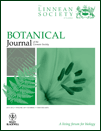
BOTANICAL JOURNAL OF THE LINNEAN SOCIETY
Cultivating Insights into Plant Biology and EcosystemsThe Botanical Journal of the Linnean Society, published by Oxford University Press, stands as a premier platform for interdisciplinary research within the realms of Ecology, Evolution, Behavior, and Plant Science. With a notable impact factor reflective of its esteemed reputation, this journal is classified in the Q1 quartile for both Ecology and Plant Science, placing it among the most influential publications in these fields. Since its inception in 1969, and with an anticipated convergence of research extending to 2024, it has become essential for scholars and professionals seeking to engage with cutting-edge studies, theoretical frameworks, and practical applications that drive our understanding of plant biology and ecological systems. The journal’s commitment to excellence is underscored by its robust Scopus rankings—achieving an impressive 83rd percentile in Ecology and a 82nd percentile in Plant Science. This makes the Botanical Journal of the Linnean Society a crucial resource for researchers, educators, and students alike, eager to advance their knowledge and contribute to the evolving discourse in botany and environmental studies.
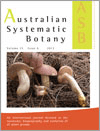
AUSTRALIAN SYSTEMATIC BOTANY
Pioneering Insights into Systematic BotanyAustralian Systematic Botany is a prestigious academic journal dedicated to the field of plant science, published by CSIRO PUBLISHING. Established in 1988, this journal has become a vital resource for researchers, professionals, and students focusing on the systematic study of Australian flora. With an impressive track record and convergence extending to 2024, it operates in the Q3 category for Ecology, Evolution, Behavior and Systematics and Q2 for Plant Science as of 2023. The journal holds significant value in the academic community, given its Scopus ranking, which places it in the 61st and 59th percentiles within its respective categories. Although it follows a subscription-based model, the journal remains committed to advancing knowledge in systematic botany, offering critical insights that shape the future of ecological and biological research both in Australia and globally.

TAXON
Connecting theory and practice in biological sciences.TAXON is a premier international journal published by Wiley, dedicated to the fields of ecology, evolution, behavior, systematics, and plant science. With a distinguished history since 1970 and a commitment to advancing knowledge in the biological sciences, TAXON has been recognized in the Q1 category for both its ecological and plant science contributions as of 2023. The journal boasts an impressive Scopus ranking, placing it in the 76th percentile for Ecology, Evolution, Behavior and Systematics and the 74th percentile for Plant Science, highlighting its significance and impact within these domains. While not an open-access publication, TAXON offers a wealth of high-quality research articles, reviews, and discussions, making it an indispensable resource for researchers, professionals, and students alike seeking to deepen their understanding of biodiversity and systematics. For access to its cutting-edge research, readers can follow the journal's updates and contributions online.
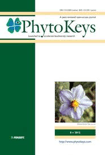
PhytoKeys
Fostering collaboration in the world of plants.PhytoKeys is a prominent open-access journal published by PENSOFT PUBLISHERS that has become a vital resource in the fields of Agricultural and Biological Sciences, Ecology, Evolution, Behavior and Systematics, and Plant Science. Since its inception in 2010, PhytoKeys has provided a platform for researchers and scholars to disseminate high-quality botanical research, making it increasingly relevant globally. The journal enjoys a commendable impact factor reflected in its 2023 ranking, positioning it in the Q2 quartile across multiple categories, including the 61st percentile in Agricultural and Biological Sciences (miscellaneous) and the 53rd percentile in Plant Science. With a dedicated editorial board and a mission to advance our understanding of plant diversity, taxonomy, and conservation, PhytoKeys supports the academic community by facilitating accessibility to cutting-edge research. Its commitment to open access ensures that valuable knowledge is readily available to researchers, professionals, and students worldwide, fostering collaboration and innovation in plant sciences.
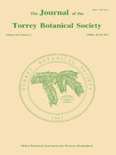
JOURNAL OF THE TORREY BOTANICAL SOCIETY
Fostering innovation in ecology and plant science.JOURNAL OF THE TORREY BOTANICAL SOCIETY is a prominent academic journal dedicated to advancing the fields of botany and ecology, published by the esteemed TORREY BOTANICAL SOCIETY. With an ISSN of 1095-5674 and an E-ISSN of 1940-0616, this journal serves as a critical platform for researchers, professionals, and students to share their findings and insights. Despite its status in the Q4 category for the 2023 rankings across Ecology, Plant Science, and Ecology, Evolution, Behavior and Systematics, the journal continues to foster significant discourse and collaboration in the botanical sciences, aiming to elevate the understanding of plant biology and ecosystems. Its open access options enhance accessibility, ensuring that groundbreaking research reaches a wider audience. Published in the United States, the journal features work from both established scientists and emerging scholars, making it a vital resource for anyone involved in the study of plants and their environmental interactions. Explore the JOURNAL OF THE TORREY BOTANICAL SOCIETY to engage with cutting-edge research and contribute to the ongoing dialogue in the botanical sciences.
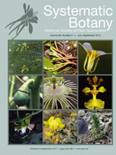
SYSTEMATIC BOTANY
Fostering Innovation in Plant TaxonomySystematic Botany, published by the American Society of Plant Taxonomists, is an esteemed journal focusing on the diverse fields of plant taxonomy, systematics, and evolution. With an ISSN of 0363-6445 and an E-ISSN of 1548-2324, this journal serves as a critical platform for researchers aiming to advance our understanding of plant biodiversity and evolutionary relationships. Operating since 1994, Systematic Botany has garnered significant recognition, achieving a Q2 ranking in Ecology, Evolution, Behavior and Systematics, and Plant Science categories, and ranking within the top half of Scopus for Genetics. The journal prioritizes publishing high-quality, peer-reviewed research, making it an essential resource for academics, practitioners, and students alike. Although it does not provide open access options, the journal's robust reputation in both American and international botanical research speaks to its pivotal role in disseminating vital scientific knowledge in the field. For those interested in the latest advancements in plant science, Systematic Botany is indispensable.